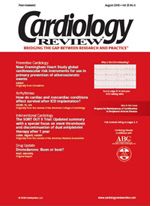Case report: Statin use before hospitalization
A 75-year-old white woman with a history of hypertension and hyperlipidemia presented with 4 hours of waxing and waning substernal chest discomfort. She had been taking aspirin, captopril (Capoten), and atorvastatin (Lipitor). On initial examination, the patient appeared slightly anxious but was in no obvious distress. She had a heart rate of 95 beats per minute, a blood pressure of 145/88 mm Hg, and a respiratory rate of 14 breaths per minute. The rest of the physical examination was normal, with the exception of an S4 gallop. Results of the initial electrocardiogram (ECG) showed 0.5-mm ST-segment depressions in the lateral leads.
The patient was treated with nitrates, morphine, oxygen, and aspirin, with complete resolution of her symptoms and ECG changes over 30 minutes. She subsequently was shown to have had a myocardial infarction based on tests of her enzyme levels. Results of the remainder of her blood tests were normal, with the exception of a slightly increased aspartate aminotransferase level, at 65 U/L. The initial lipid profile showed a total cholesterol level of 175 mg/dL, triglyceride level of 110 mg/dL, high-density lipoprotein cholesterol level of 55 mg/dL, and low-density lipoprotein cholesterol level of 98 mg/dL.
The patient was admitted to the hospital. Aspirin and captopril were continued; nitropaste, metoprolol (Lopressor, Toprol XL), and heparin were added to her regimen. Atorvastatin was not continued because of the slightly increased aspartate aminotransferase level. On hospital day 3, the patient had a sudden recurrence of substernal chest pain associated with marked dyspnea. The examination was consistent with pulmonary edema. Results of the ECG showed ST-segment elevation in leads I, aVL, and V4 through V6. The patient was brought emergently to the cardiac catheterization laboratory, where a 100% circumflex lesion was successfully stented. The patient subsequently made a full recovery and was discharged receiving aspirin, clopidogrel (Plavix), metoprolol, and captopril.
In this case the patient’s atorvastatin was mistakenly discontinued due to a house officer’s concern about mildly elevated aspartate aminotransferase (a common laboratory finding following myocardial infarction). Although a causal link between her recurrent ischemic event and discontinuation of atorvastatin therapy can only be postulated, recent observational studies (including the GRACE analysis presented here) suggest such an association may be present. In addition, the patient was not discharged on atorvastatin, and previous studies have suggested this increases the likelihood that she will not be restarted on statin therapy as an outpatient, which in turn may be associated with a worse long-term outcome.
